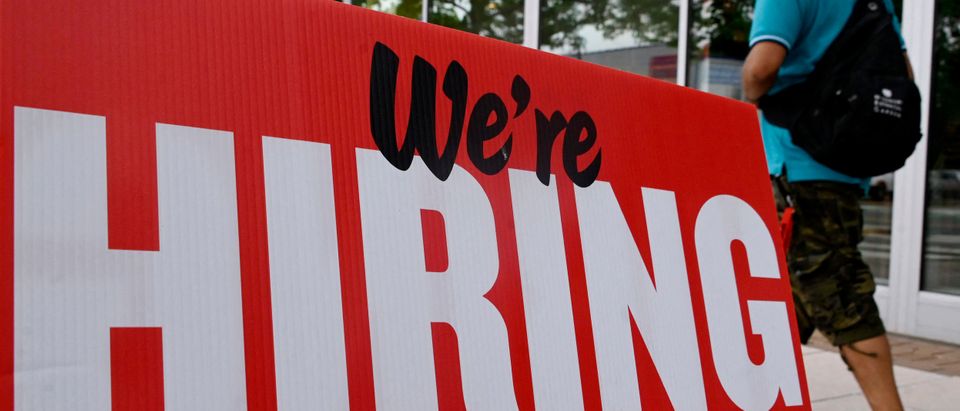- Economists from across the political spectrum took Friday morning’s unexpectedly strong jobs report as a sign that inflationary pressure remained resilient to high interest rates, leading some to question if inflation could be contained without starting a recession.
- At the same time, the Bureau of Labor Statistics’ payroll survey can double count people with multiple jobs, casting doubt on whether job growth was as strong as it was reported, Heritage Foundation economist E.J. Antoni told the Daily Caller News Foundation.
- “You can’t understate how huge this [wage data] is,” said Jason Furman, former chair of the Council of Economic Advisers under President Barack Obama. “I was allowing myself to get more hopeful about a soft landing … but this pretty much dashed that hope.”
A number of economists from across the political spectrum took Friday morning’s unexpectedly strong jobs report as a sign that inflation would stay high despite the Federal Reserve’s aggressive campaign of interest rate hikes this year.
The U.S. added 263,000 jobs in November, shattering investor expectations and remaining stubbornly persistent despite high interest rates — pushed up by the Fed — that typically blunt demand for labor and ease inflation, according to CNBC Friday. Jason Furman, former chair of the Council of Economic Advisers under President Barack Obama, took to Twitter following the report, noting that wages grew at 6% over the past three months, a measure he estimated was consistent with 5% annual inflation — more than twice the Fed’s 2% target. (RELATED: JPMorgan Strategists Predict Stock Plunge, Recession As Early As First Half Of 2023)
“Strong nominal wage increases won’t make the Fed’s goal of reducing consumer price inflation any easier,” Bob Hughes, a senior researcher at the American Institute for Economic Research, told the Daily Caller News Foundation. “Continued payroll gains amidst a tight labor market are likely to sustain upward pressure on [average hourly earnings] and support elevated inflation.”
When the data don’t tell you what you want to hear, you have to listen. I was a lot more optimistic about near-term inflation at 8:29 this morning than I am now https://t.co/uNFrUXElrK
— Paul Krugman (@paulkrugman) December 2, 2022
Inflation came in below expectations in October, at 7.7% annually, and has been cooling slowly since peaking at 9.1% in June, according to the Bureau of Labor Statistics. Some economists have been concerned that if the Fed continues to push interest rates higher, the U.S. will be unable to achieve a “soft landing,” where inflation can be tamed without a recession, according to Yahoo Finance.
“You can’t understate how huge this [wage data] is,” said Furman on Twitter. “I was allowing myself to get more hopeful about a soft landing … but this pretty much dashed that hope.”
Hughes noted that job openings fell slightly in October, and willingness to cut jobs was increasing, both of which were signs that wage growth might ease.
“I wouldn’t give up hope for a soft landing quite yet,” said Hughes. However, “if labor demand remains strong, wages continue to rise rapidly, and inflation stays elevated, then the Fed will need to stay aggressive, and hopes for a soft landing fade.”
Another point of concern was the discrepancy between the “establishment” and “household” surveys conducted by the Bureau of Labor Statistics (BLS), Heritage Foundation economist E.J. Antoni told the DCNF. The former polls businesses’ payrolls and counts people multiple times if they have more than one, while the latter polls households and does not repeatedly count one person with multiple jobs, according to the BLS.
“Since March, the two surveys have seen a massive and unprecedented divergence of 2.7 million people,” said Antoni. “One reason is double counting in the establishment survey, with over 900k of the jobs added in the last year being double counting, not additional people employed.”
Antoni noted that the manufacturing sector in particular, which contracted significantly last month, was poised for layoffs. Antoni argued that weakness in manufacturing typically forecasted weakness for the rest of the economy.
“When the data don’t tell you what you want to hear, you have to listen,” Paul Krugman, a Nobel Prize-winning economist and columnist for The New York Times, tweeted Friday in response to Furman. “I was a lot more optimistic about near-term inflation at 8:29 this morning than I am now.”
Furman did not immediately respond to a Daily Caller News Foundation request for comment.
All content created by the Daily Caller News Foundation, an independent and nonpartisan newswire service, is available without charge to any legitimate news publisher that can provide a large audience. All republished articles must include our logo, our reporter’s byline and their DCNF affiliation. For any questions about our guidelines or partnering with us, please contact licensing@dailycallernewsfoundation.org.












